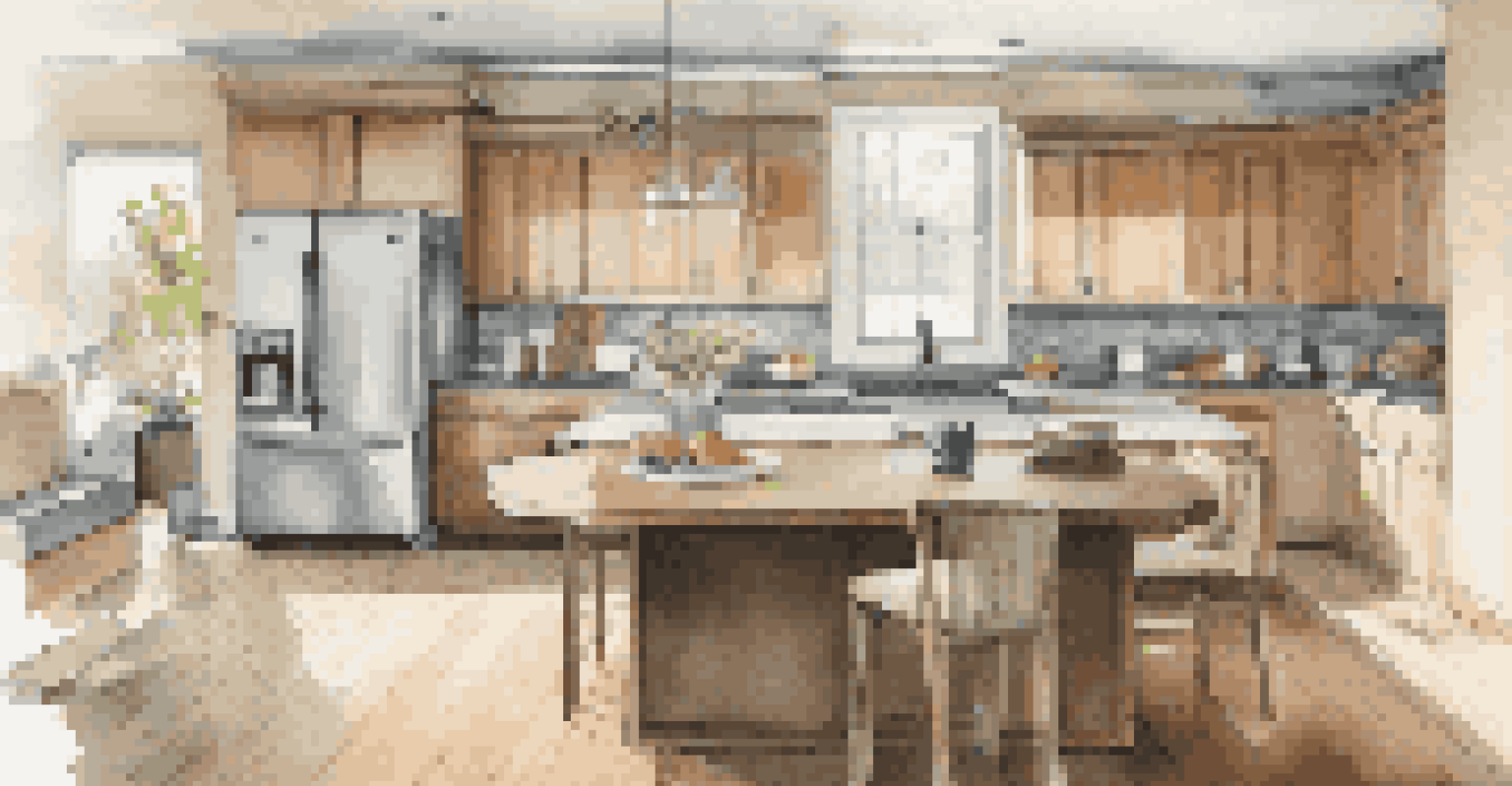How to Avoid Common Mistakes in DIY Home Renovations

Understand Your Project Scope Before Starting
Before diving into any DIY home renovation, it’s crucial to define your project scope. This means understanding what you want to achieve and the steps needed to get there. A clear scope helps you stay focused and prevents you from getting sidetracked by impulsive ideas that might arise during the process.
The only way to do great work is to love what you do.
To illustrate, imagine you’re planning to renovate your kitchen. If you start with a clear vision of the layout, color scheme, and materials, you’re less likely to make hasty decisions that could lead to costly mistakes. Spend some time brainstorming and mapping out your project before picking up a hammer.
By solidifying your project scope upfront, you’ll also be able to set realistic timelines and budgets. This preparation will save you both time and money, allowing your renovation to run smoothly and successfully.
Create a Realistic Budget and Stick to It
Budgeting is one of the most essential yet overlooked aspects of DIY home renovations. It’s easy to underestimate costs, especially when you factor in materials, tools, and unexpected expenses that may arise. By creating a detailed budget, you’ll have a clearer picture of what you can afford and where to allocate your resources.

For example, if you initially budgeted for a simple paint job but later decide to replace cabinetry as well, you might find your finances stretched thin. It’s wise to include a contingency fund—typically 10-20% of your total budget—for those surprise costs. This way, you won’t feel overwhelmed by unexpected expenses.
Define Your Project Scope Clearly
Understanding your project scope helps keep your renovation focused and minimizes costly mistakes.
Sticking to your budget also means making informed choices about materials and labor. Consider shopping at local stores for sales or even checking online marketplaces for second-hand items that can fit your design without breaking the bank.
Research and Gather Necessary Permits
Many DIY enthusiasts overlook the importance of permits, which can lead to serious complications down the line. Depending on the nature of your renovation, you may need various permits from local authorities. Failing to secure these can result in fines or the requirement to undo your work, which is the last thing you want.
Success is the sum of small efforts, repeated day in and day out.
For instance, if you’re planning to knock down a wall, that’s a big red flag for needing a permit. Researching your local building codes and regulations ahead of time will save you from headaches later. Websites and local government offices often provide resources that outline what permits you may need.
By taking the time to gather the necessary permits, you can proceed with confidence, knowing that your project complies with regulations. This proactive step will not only keep you in good standing with the law but also enhance the value of your home.
Invest in Quality Tools and Materials
When it comes to DIY renovations, the quality of your tools and materials can significantly impact the outcome. While it might be tempting to cut costs by purchasing cheaper options, this often leads to more issues in the long run. Quality tools make your job easier and help achieve professional-looking results.
For example, using high-quality paint can save you from the hassle of needing multiple coats, while a sturdy saw will ensure clean cuts for your woodwork. Investing in good materials not only enhances the durability of your renovations but also elevates the overall aesthetic of your space.
Budget Wisely and Prepare for Costs
Creating a detailed budget, including a contingency fund, prevents financial strain during your renovation.
Moreover, high-quality tools and materials can boost your efficiency and productivity. You’ll spend less time fixing mistakes and more time enjoying your newly renovated space, making it a win-win situation for any DIYer.
Take Time for Proper Planning and Preparation
Proper planning is like laying a solid foundation for a house; it’s essential for a successful renovation. Take the time to create a detailed plan that includes timelines, tasks, and responsibilities if you have help. This foresight will help you manage your time and streamline the renovation process.
Imagine you’re renovating your bathroom. A well-thought-out plan might involve deciding which fixtures need replacing, the order of operations, and anticipating potential challenges like plumbing issues. By tackling these details ahead of time, you’ll avoid unnecessary delays and frustration.
Preparation also includes gathering all necessary tools and materials before starting. This way, you won’t find yourself halfway through a project, only to realize you’re missing a critical item. A little upfront work can translate into a much smoother renovation experience.
Don’t Rush—Take Your Time for Quality Results
In the world of DIY renovations, patience is indeed a virtue. Rushing through projects often leads to mistakes, which can be both costly and time-consuming to fix. It’s important to pace yourself and ensure each step is completed to the best of your ability before moving on to the next.
For instance, if you’re tiling a floor but are too eager to finish, you might end up with uneven tiles or gaps that mar the final look. Taking your time allows for precision and attention to detail, ensuring that the end result is something you can be proud of.
Seek Help and Embrace Learning
Don't hesitate to ask for assistance when needed, as collaboration can enhance your skills and project outcomes.
Remember, a well-done renovation is a reflection of your effort and creativity. By allowing yourself the time to do things right, you’ll not only enhance the beauty of your home but also gain satisfaction from a job well done.
Get Help When Needed—Don’t Hesitate to Ask
One of the biggest mistakes DIYers make is thinking they have to do everything alone. While taking on a project yourself can be rewarding, there’s no shame in seeking help when needed. Whether it’s asking a friend for assistance or hiring a professional for certain tasks, collaboration can lead to better results.
For example, if you’re unsure about electrical work, it’s wise to consult with a licensed electrician. Their expertise can not only ensure safety but also save you time and potential headaches. Remember, asking for help doesn’t diminish your DIY spirit; it enhances it.

Additionally, learning from others can provide valuable insights and tips. Collaborating with experienced friends or family can improve your skills and give you the confidence to tackle future projects. Don't hesitate to leverage your network!
Embrace Imperfection—Learn and Grow from Mistakes
Every DIY renovation comes with its share of challenges and mistakes, and that’s perfectly okay! Embracing imperfection is part of the journey. Rather than getting discouraged by setbacks, view them as opportunities to learn and grow.
For instance, if a paint color turns out different than expected, it can be a chance to explore creative solutions or adapt your design. Every misstep offers valuable lessons that can enhance your skills for future projects.
Moreover, accepting that perfection is unattainable allows you to focus on the joy of creating. Celebrate your accomplishments, however small, and remember that every renovation is a step towards building your dream home.